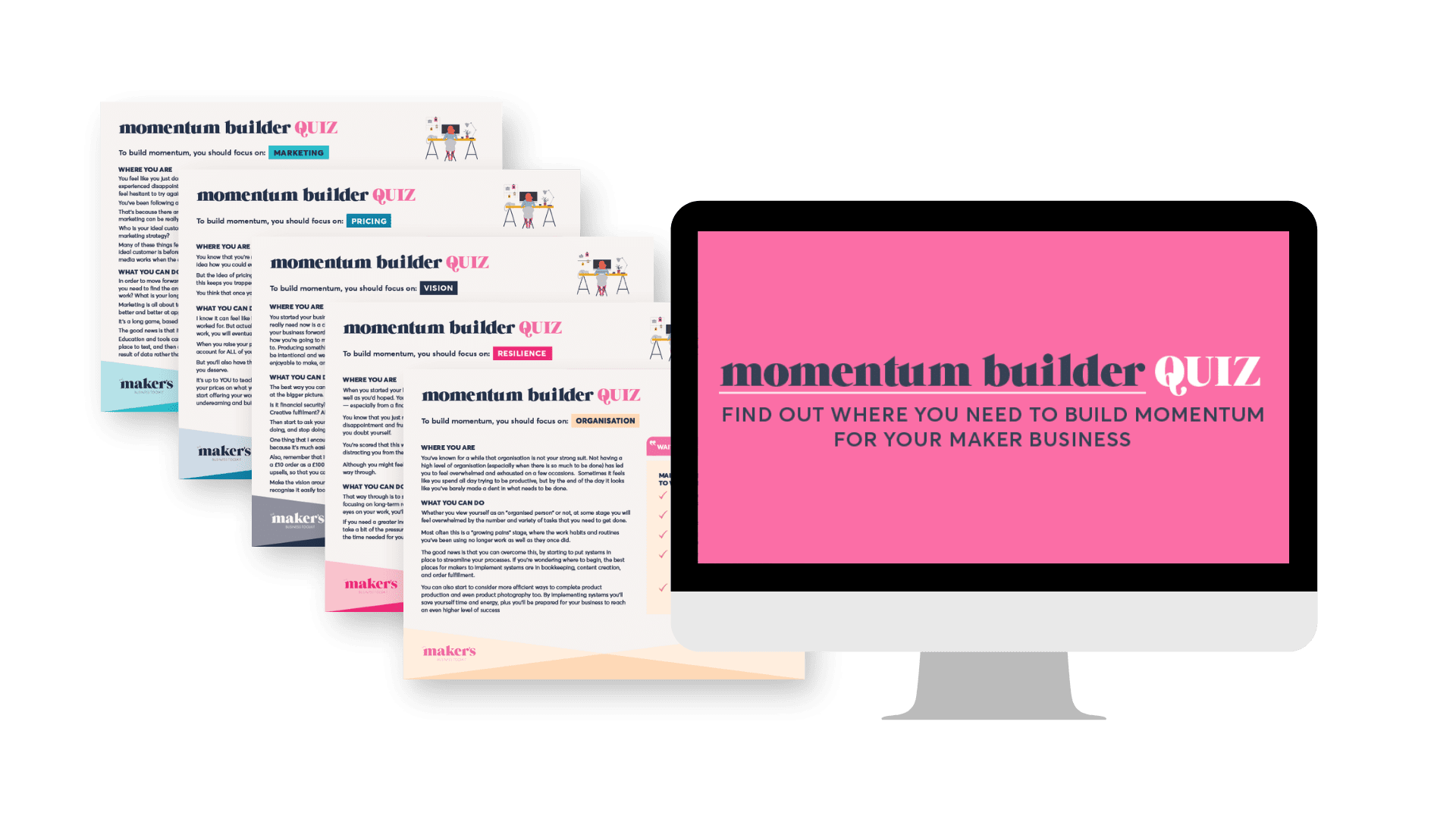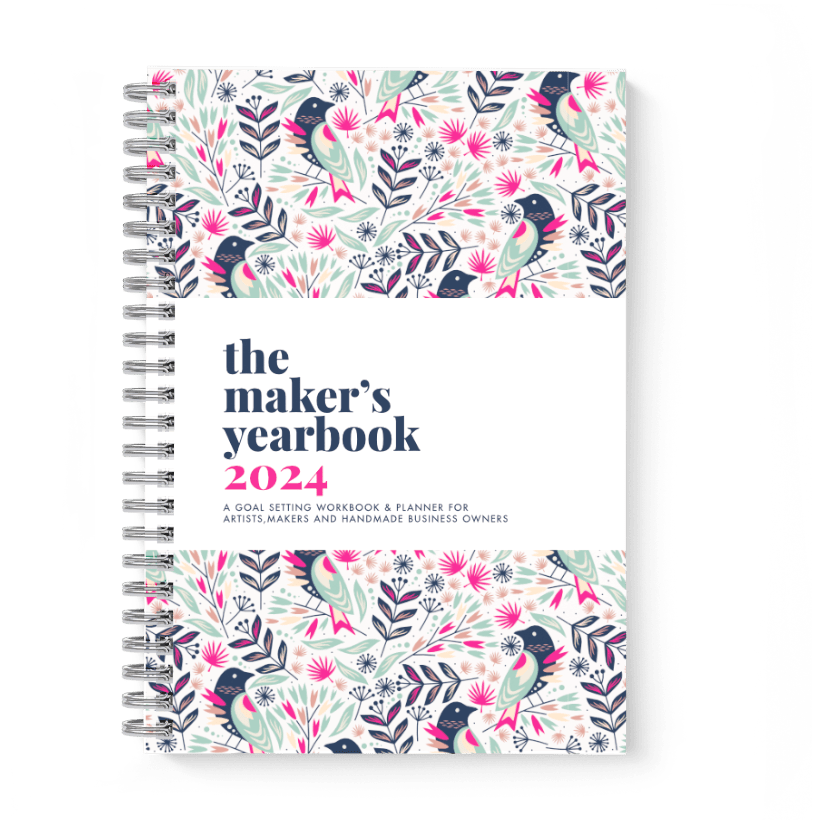When I ask the members of Makers’ Momentum Club whether they would like more time or more money, there’s usually one clear winner.
More time.
We all want to have more time. More time with our friends and family. More time for creating. More time to do all of those business tasks that you just haven’t been able to get to yet.
But as my dad is always fond of reminding me – when you work for yourself, time and money are kind of the same thing.
If you spend a lot of time on the wrong things, that definitely leads to less money in your pocket.
And when you make more money, you’re often able to more easily get help with the workload, take more time off and enjoy life a little more.
So how can you get more done in your maker business?
1. Try to do less
I know it sounds back to front but one of the most important things you can start doing if you want to get more done is to start making smaller to do lists.
Because you’ve probably already got far more time than you realise. It’s just that quite a bit is being wasted on indecision and overwhelm.
There’s nothing like a 10 page to-do list to make you feel exhausted before you start. And that often leaves you ready to check out and scroll mindlessly for an hour or so.
So what can you do instead?
Set yourself no more than three things to do each day.
This will feel like AGONY at first. It’s so hard to choose just three things from a big list and if you’re struggling, take a moment to think about whether you’re actually getting more than three things completed per day right now.
Chances are that you’re not and that a lot of time is being wasted on getting distracted by the other items on your to do list.
Maybe you’re starting more than three things, doing a bit from here and a bit from there, but nothing much is getting finished. And the to do list never seems to get any shorter.
If you need the support of a planner that will help you to establish this habit, while also not losing track of those longer to do lists and your big goals for the year, check out the Maker’s Yearbook.
2. Charge Fair Prices
If you are undercharging you may find that, as your business begins to grow, you get more and more overwhelmed with all of the things that need to get done in a day.
When that happens, it’s easy to think you just need to work harder, or you need to find more efficient ways to do the work, but really it’s a classic sign that your prices are too low.
This is how it happens.
When you first start out, maybe you don’t really work out your prices properly, or you use a mixture of a basic formula and some guesswork based on what your friends said they would pay for work like yours.
But what you’ve probably forgotten is that as a maker, you only get paid when someone buys something.
So what about all of the time that you spend marketing your work, packing it up and shipping it out, doing your business admin, and selling your work at events?
How do you get paid for that time?
Unless you include it in your prices, you don’t.
At the beginning, you’re probably doing less business admin and less packing and shipping. When you’re not selling that much, there is less of this work to do.
So you don’t notice it at first.
But as you start to grow, that work starts to ramp up. And you’re not getting paid for it.
Over time this unpaid labour builds up and builds up until your time is completely tapped out. There’s nothing left.
You physically cannot do any more, and you’re probably still not making enough money to live on, because you’re only getting paid for half of your work.
You’re not a factory. You’re not a sweatshop.
If you’re feeling the need to be more productive because you’re struggling to keep up with the amount of work you think you need to do to make a profit, it’s time to take a good look at your prices and make sure that they aren’t based on unpaid labour.
3. Assess the return on your time as well as on your money.
The job of a business is to take £1 and make it into more than £1.
Yes, we are creative businesses but we still want to be profitable (so that we can, you know, eat and stuff).
And if we want to be profitable we need to make sure that when we invest our money, we get more back than we initially invested.
If you have been using our free Craft Fair Profitability Tracker, then you know that when you’re signing up to an event, you want to get a return on the money you spend.
That doesn’t always have to be money now. Sometimes it can be email subscribers that can translate into more sales and more money later.
But we want to be better off in some way than if we’d just stayed at home making stuff. Because, otherwise why wouldn’t we just do that?
Or why wouldn’t we do something else that gives us a better return?
Maybe a show gives us a return of a couple of hundred pounds, but advertising on Instagram gets us a return of several thousand pounds, all without packing up the car and spending half the day listening to people tell their kids to copy your work.
Knowing the return we can get on our money spent allows us to make better decisions on how to spend it.
And it’s exactly the same for our time.
There are lots of things you could work on today, but only some of them are likely to deliver more sales in the short term.
- Posting on social media? It could if you do it right
- Emailing your subscribers? Definitely a good chance
- Setting up an email list? If you haven’t got one them yes definitely. You’re missing out on sales by not having one.
Reorganising your workspace? Not so much
Fiddling with your website? Probably not – I bet it’s good enough
Standing all day in the rain for free as a hundred people tell you that they’ll be back later? Definitely not.
Spending your time on the right things means more money for you.
But it also means that you can say no to some things that don’t matter. Or that can wait.
Being aware of the return you get on the time you invest into your business allows you to compare tasks and decide if you really want to be fiddling with the text size on your website buttons vs recording a Reel that explains how to use/store/display or care for your products.
We don’t know what kind of return we’re going to get by having different text on the buttons but I bet it’s not as good as having a really nice piece of useful content that helps remind your buyers what you make and why they want it. Plus it probably gets your work in front of a few new people too.
Being more efficient isn’t about doing more in less time. It’s about cutting waste.
It’s about cutting out the time you waste getting distracted because you don’t know what to work on first.
It’s about getting paid for all of the work you do, so that you don’t have to work twice as hard to make half as much.
It’s about being intentional with how you spend your time. Avoiding the busywork and knowing that when you decide that you can’t bear that bloody font a single minute more, it’s just your mind trying to keep you distracted from the much more uncomfortable work of being visible today.
How are you going to get started with being more efficient in your maker business today?
If you’d like some support, here’s how we can help.
- The Maker’s Yearbook will help you to more easily prioritise your workload and avoid the overwhelm of massive to do lists.
Yearbook users tell us that it helps them to focus better day to day, feel more in control of their business and manage their orders and commissions better. Find out more here.
- Makers’ Momentum Club is our membership for artists and makers who want to make more money from their businesses.
Over 30 short business courses, resources to help you calculate your pricing, improve your profitability and better promote and sell your work, plus the opportunity to get your questions answered and sometimes your butt kicked (with love). Find out more here.








